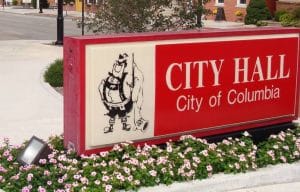Waterloo water test issues persist
Continuing a trend since its new water plant became operational in December, the City of Waterloo announced Friday it failed to provide required water samples within the designated timeframe as required by the Illinois Environmental Protection Agency for a third time.
Waterloo Mayor Stan Darter said the late sampling violations from the IEPA may total five in this latest round, as it was one set of tests for different components of the city’s water system.
“We want to emphasize that this reporting violation is solely due to the delayed submission of required samples,” the city’s press release stated. “Test results confirm that the water quality meets or exceeds safety standards and remains excellent quality and completely safe to drink.”
The sample collection, which was a quarterly sample required by the IEPA, was delayed by eight days due to “what appears to be an oversight,” the city said.
“We are currently working to identify the root cause of this issue,” the press release stated. “While the delay was unintentional, it does not relieve the city of its responsibility. Please be assured that the samples have since been collected and submitted to the lab for analysis.”
A similar issue occurred in February after which the city was notified by the IEPA of a violation in mid-April regarding a late sample. That required sample period was Feb. 1-15, with the water sample taken Feb. 25.
Waterloo was first cited by the IEPA for a late water sample in December as the new plant was going online.
The city’s new water treatment facility located in Valmeyer went online in late December, ending a contract with Illinois American Water that would have resulted in increased rates.
The new state-of-the-art treatment facility features a trio of wells off Bluff Road, about a mile north of Old Valmeyer. These wells drill into the Mississippi Aquifer, working one at a time throughout the day.
The city has hired Certop Inc. – a contract water operating company out of Clinton County – for operation, maintenance and management of its new $30 million plant.
The city was apologetic in tone in its news release announcing this latest round of late test samples.
“These delays are unacceptable, and we are actively working to correct the underlying issues to ensure timely compliance going forward,” the city said. “Despite these incidents, we continue to meet the other regulatory deadlines. This includes submission of the monthly routine samples, completion of 60 lead and copper samples by the June 30 deadline, preparing the Consumer Confidence Report, and public notices as required by the IEPA.”
In the event of water main breaks that require public notification, the city said it continues to promptly notify all affected customers with a boil order advisory, along with the IEPA and Monroe County Health Department.
“We believe that if the IEPA determined our water to be unsafe or our practices to be non-compliant with regulations, they would have the authority to intervene,” the city said. “At this time, we have received no such indication. We appreciate your understanding and remain fully committed to transparency, accountability, and the highest standards of water quality for our community.”
The topic of late water samples was covered in detail during Monday’s monthly utility meeting at City Hall.
“We are still in the discovery mode of trying to determine where the breakdown is presently,” Waterloo Public Works Director JR Landeck said. “Obviously, I’m disappointed (in the late tests). The water is safe, and we have no reason to believe it is not.”
Darter further elaborated to Landeck’s point.
“The water that comes out of the well (for the city’s plant) is safe to drink for everyone,” he stressed. “We are required by the Illinois EPA in order to process this water further, to add chlorine, in order to make it safe for when it stays either in the elevated tower or in the lines for a longer period of time. People have been drinking that well water now for, obviously, for all of the hundreds of years that people have lived here. There’s nothing unsafe about the water. We did fail to take a water test, a water sample, as quickly as we should have. And that is our fault.”
Darter added that the city has filed Freedom of Information Act requests to the IEPA and laboratories involved in its water testing process in an effort to determine where the breakdown is occurring.
Darter and Landeck, along with Waterloo Deputy Public Works Director Nathan Krebel, also explained that in addition to water testing conducted five days per week, there are routine monthly samples and an array of quarterly samples conducted according to IEPA standards.
Some of these tests require a kit that is prepared by a lab and sent to the city according to IEPA protocol.
“It’s a very complicated process,” Darter said. “Obviously, we need to conquer that.”
Landeck said the city is trying to understand where the testing process between the city itself, Certop, the IEPA and labs is not connecting of late.
“Myself, Nathan, we take this to heart,” Landeck said.
Landeck further elaborated that there are tests the city “didn’t know (it) needed to take” due to change in water source from surface to groundwater.
“There’s a lot of moving parts,” Krebel said.
Darter stressed that the city has not had a failed water test, rather just late samples sent to the IEPA.
One male meeting attendee asked why the city contracts with Certop given these testing issues.
Darter replied that city employees take many of the samples, with Certop conducting tests at the plant itself.
“Then the city should have their own water team,” the man said.
“It’s much more complicated than that,” Darter replied.
A female attendee of Monday’s meeting asked when the testing issues will be rectified and someone will be held accountable.
“I’m tired of buying bottled water and my water tasting like crap,” she said.
“There’s nothing wrong with your water,” Darter replied.
“You wanna come to my home and look at my ice cubes?” the woman countered.
Darter said the city would visit her home and conduct tests to ensure her water is safe to drink.
When asked by the Republic-Times why the city did not receive these water samplings violations prior to its new plant going online, Darter replied that “Illinois American would have been responsible for this type of testing because they were the water producers and we were a customer buying their water.”






